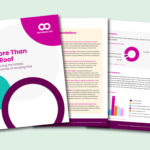New research published by charity Homeless Link, proves that Housing First support can deliver huge improvements to people’s physical and mental health and their likelihood to re-offend, as well as ending their homelessness. It also reduces pressure and cost across many public services.
Housing First is an intervention aimed at people with experience of entrenched or repeat homelessness and a combination of support needs including health, mental health, offending behaviour, social care and substance misuse. These often stem from experiences of childhood trauma and social exclusion. It works by guaranteeing people a home while they access intensive long-term support.
Homeless Link’s research looks in detail at the long-term holistic impacts of Housing First beyond ending homelessness, investigating outcomes over a three-year period. The national findings are based on a range of sources including a survey of Housing First providers representing 934 residents, interviews with frontline staff and peer research carried out with people with lived experience of Housing First.
The research shows that after three years:
- 39% of Housing First residents had improved physical health,
- 55% of residents had improved mental health,
- there is a significant 20% decrease in A&E use down to 38% of residents,
- and there is a drop in hospital admissions from 38% to 18%.
At the same time as emergency healthcare usage decreased, engagement with preventative healthcare services increased. Use of GPs rose from 50% to 89% over three years, mental health support from 23% to 32% and drug and alcohol services from 48% to 60%.
The research also revealed that the percentage of residents engaged in antisocial or offending behaviour fell sharply from an average of 84% at the point of entry into Housing First to just 45% by the end of the third year. Consequently, there is a massive reduction in engagement with the criminal justice system, from 71% to 39%.
The findings further point to improved quality of life, with 37% of residents saying they had hobbies or interests after three years compared to only 9% on entry to Housing First. The number of people reporting positive social networks more than doubled.
Rick Henderson, CEO at Homeless Link, the national membership body for frontline homelessness services, said: “The trauma of entrenched homelessness, poverty and social exclusion means a small but significant cohort of people see their needs consistently unmet by traditional homelessness services. They suffer from worse physical and mental health and are often caught in a revolving door of contact with services including offending and prison release, substance abuse and social care. Our research shows that, in Housing First, we have a solution that will not only be life-changing for thousands of people but will reduce expensive emergency services use as well as the pressure on a range of other public services. It’s a no-brainer.
“Housing First is so much more than a homelessness intervention, and yet we continue to view it through this narrow lens, restricting its potential. We need to shift the narrative, so that sectors from health to criminal justice and beyond can champion it and invest in collaborative working for improved outcomes for the people they support.
“But to make Housing First work we cannot continue with short-term funding cycles and government departments working in silos. We are calling on the next government to introduce a strategic, sustainably funded, cross-departmental national Housing First programme. With this in place, we will be empowered to break the cycles of homelessness and transform the lives of the estimated 16,450 people who need it in England.”
You can read the full research report here.










